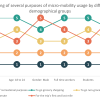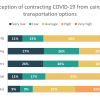Description
The COVID-19 pandemic has exerted a widespread and unequal influence on travel behaviors, resulting in a decline in mobility across various modes of transportation. Notably, shared mobility services, including bike-sharing, e-scooter sharing, and ride-hailing, have experienced significant reductions due to concerns regarding the heightened risk of COVID-19 transmission and infection. Consequently, this research aims to investigate travelers' intentions to utilize shared mobility services following the relaxation of COVID-19-induced restrictions. In pursuit of this objective, a survey was conducted during fall of 2022, collecting responses from a sample of 1,650 individuals residing in three selected cities within the Midwest region of the United States. These cities were chosen to reflect variations in size, population density, and the degree of established shared mobility services. The survey encompassed information on actual travel habits, expected travel habits, COVID-19 preferences, Micromobility usage and opinions, Theory of Planned Behavior (TPB) questions for Micromobility/ ride-hailing/ online shopping, COVID-19 emerging activities such as teleworking and online shopping, ride-hailing usage and opinions, opinion questions on the environment/ technology/ sharing, and household characteristics. The dataset is deidentified so that it does not include sensitive information about participants such as demographical characteristics. A covariance-based multigroup structural equation modeling (MG-SEM) is employed to empirically evaluate the research hypotheses, affording a means to compare diverse travel preferences and patterns among users from the three cities. The findings of this study furnish valuable insights for service operators, enabling them to anticipate potential upswings in demand and inform operational decisions accordingly. Moreover, the outcomes can assist operators in mitigating the sustained decline in ridership by implementing incentives, engaging with stakeholders, and devising novel market strategies aimed at invigorating shared mobility service utilization.
Cite this work
Researchers should cite this work as follows:
- Gkritza, K.; Chahine, R. (2023). CCAT COVID-19 Impact on Shared Mobility Survey. Purdue University Research Repository. doi:10.4231/K57J-VD94


